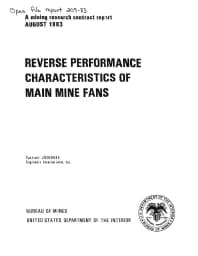Mining Publication: Reverse Performance Characteristics of Main Mine Fans
Original creation date: August 1983
Authors: MF Dunn, S Bhattacharya, V Rajaram
NIOSHTIC2 Number: 10003480
Engineers International, Inc. U.S. Department of the Interior, Bureau of Mines, Contract No. J0308044. NTIS No. PB84-143726, 1983; :1-65
During a mine fire or other emergency, it may be desirable to reverse the airflow in order to provide an escapeway or to isolate a fire. Also, in colder areas, the airflow may be reversed to prevent ice buildup. When reversing main mine fans, the mine operator usually does not know what operating characteristics of flow and pressure to expect. Laboratory and field tests of vane axial main mine fans in the 7- to 9-ft diameter size range were conducted to establish forward and reverse performance characteristics under controlled conditions and at typical mine installations. The data obtained suggest that reverse performance characteristics are dependent upon the blade angle and the hub to tip ratio. There is also evidence that reverse performance can be predicted for a family of blade angles and a given hub to tip ratio. Generally, quantity of air is 30% to 65% less in reverse than when operating in the normal forward mode.

NIOSHTIC2 Number: 10003480
Engineers International, Inc. U.S. Department of the Interior, Bureau of Mines, Contract No. J0308044. NTIS No. PB84-143726, 1983; :1-65
- Behavioral and Organizational Dimensions of Underground Mine Fires
- Experimental and Modeling Investigation of the Effect of Ventilation on Smoke Rollback in a Mine Entry
- Experimental and Modeling Investigation of the Effect of Ventilation on Smoke Rollback in a Mine Entry
- A Gas Pressure-Based Drift Round Blast Design Methodology
- In-depth Survey Report: Control Technology for Environmental Enclosures - The Effect of Wind Speed Upon Aerosol Penetration Into an Enclosure at Clean Air Filter, Defiance, IA
- Multiple Type Discriminating Mine Fire Sensors
- Smoke, Carbon Monoxide, and Hydrogen Chloride Production from the Pyrolysis of Conveyor Belting and Brattice Cloth
- Technology News 497 - "You Are My Sunshine": A New Video Release From NIOSH on the Sunshine Mine Fire
- Technology News 499 - Using Propeller Fans to Improve Ventilation in Large-Entry Stone Mines
- Technology News 549 - MFIRE 3.0 - NIOSH Brings MFIRE into 21st Century